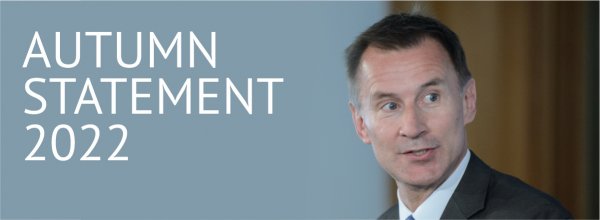The new chancellor, Jeremy Hunt, gave his long-awaited full fiscal statement on 17 November.
What does the Autumn Statement 2022 mean for small businesses?
Personal Tax
-
The threshold for the 45% Additional Rate of income tax will be reduced from £150,000 to £125,140
-
The Personal Allowance and Higher Rate threshold for income tax were fixed at their current levels until April 2026. It has been announced that they will remain fixed for another two years until April 2028.
-
National Insurance contributions (NIC) will be fixed at their current levels for an additional two years until April 2028
-
Inheritance tax nil-rate band and residence nil-rate band will remain fixed at current levels for a further two years until Another 2028
-
The Dividend Allowance will be reduced from £2,000 to £1,000 from April 2023, and reduced again to £500 from April 2024
-
The annual exemption for Capital Gains Tax (CGT) will be reduced from £12,300 to £6,000 from April 2023 and then to £3,000 from April 2024
-
The reduction in Stamp Duty Tax that was announced in the Mini Budget will remain in place but only until 31st March 2025
-
From April 2025, electric car vehicles will no longer be exempt from Vehicle Excise Duty, a move that the Chancellor claims will make the motoring tax system ‘fairer’
Employment Tax
-
The threshold for National Insurance contributions (NIC) for employers has been frozen until April 2028
-
The National Minimum Wage (NMW) and National Living Wage (NLW) will increase to £10.42 per hour for over-23s from April 2023. This rise will result in an annual increase of over £1,600 a year for a full-time employee.
Corporate Tax
-
R&D tax relief will be reformed. For expenditure on or after 1st April 2023, the Research and Development Expenditure Credit (RDEC) rate will increase from 13% to 20%, the SME additional deduction will decrease from 130% to 86% and the SME credit rate will decrease from 14.5% to 10%.
-
The windfall tax on the energy industry will be extended, with the Energy Profit Levy increasing from 25% to 35% from 1st January 2023 until 28th March 2028. A temporary 45% levy on electricity generators will also be introduced from 1st January 2023. Combined, these taxes will generate an estimated £14 billion next year.
-
From April 2023, banks will be required to pay an extra 3% on their profits above £100 million. This charge is in addition to the Corporation Tax increase to 25%, which will also take effect from April 2023.
-
The rate of Diverted Profits Tax will increase to 31% (a 6% rise) from April 2023 to deter companies from diverting profits out of the country
-
From April 2023, business rate bills will be updated in line with changes to property values that have occurred since the previous revaluation in 2017. A targeted support package worth £13.6 billion will provide financial aid to businesses over the next five years
-
From 1st April 2023, the Annual Investment Allowance will be set at a rate of £1 million
-
The 100% first year allowance on Electric Vehicle Charging points will be extended to 31st March 2025 for corporation tax and 5th April 2025 for income tax purposes
Indirect Tax
-
The VAT registration threshold (£85,000) and deregistration threshold will remain in place for an additional two years from 1st April 2024
-
Import tariffs for more than 100 goods will be temporarily abolished for two years with the aim of reducing costs for UK production companies
-
Plans for an Online Sales Tax (OST) have been scrapped
Read the full Autumn Statement here.



21
2022